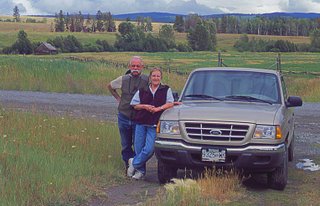[Also appearing in Vive le Canada.]
The RCMP Raids on B.C. Legislature Offices (Dec. 28, 2003).
A Tide of Corruption. Second Part.By Robin MathewsNothing can excuse B.C. Attorney General Wally Oppal. His comments about evidence in the Legislature Raids process (presently before the courts) are, quite simply, outrageous. Chatting "casually" (?) to reporters at the beginning of November, Oppal called into question wire-tapping procedures used before the raids. They were, as he spoke, being argued before a judge in Chambers.
The tide of corruption upon which the David Basi, Bob Virk, and Aneal Basi legal procedure floats is highlighted by Oppal's unacceptable intervention. In a legal hotchpotch such as this one, in which cabinet employees are under charge - one from the office of a former Attorney General - prudence should dictate silence on the part of Wally Oppal. The position he holds is always a highly sensitive one whatever the situation, for "the highest law officer of the Crown" is also an elected politician sitting in cabinet meetings in which many participants - in this government especially - may be working to defeat the ideals of justice.
We mustn't forget that the Attorney General of the day, in 2003, Gary Collins, employed one of the men charged following the legislature raids. Nor should we forget that Collins - apparently approaching the height of his political career - chose to drop out of politics shortly afterwards. We do not seem to be fortunate in the Attorneys General we get with Gordon Campbell as premier.
It may be fair to say that no one in the present government is happy to see the trial going ahead. For even if elected officials escape untouched, public opinion will wonder at the miracle. It may be fair to say, too, that the men charged are not likely to be happy to see the trial going ahead, for obvious reasons. In this trial, the government of the day and the members of cabinet connected to legal functions cannot be objective or eager to see justice done.
That makes Wally Oppal's comments doubly offensive. And they point toward the argument that may destroy the case. Is Oppal preparing the ground innocently?
Why, then, is the trial being conducted? Because the Crown and the people want the process of legal action to work for the sake of democracy, justice, and the rule of law in British Columbia. But who, we have to ask, is the Crown in British Columbia?
Oppal, himself, "chief law officer of the Crown", breached the demands of dignity and prudence when he stepped from the Supreme Court into a Liberal Party candidacy. By doing so, he made a mockery of the absolute need for a clear separation to exist - and be seen to exist - between the politicians and the courts. He is a politician who was very recently a colleague of present Supreme Court judges, allowing no time to lapse between his resignation from the court and his assumption of a political role as a Liberal candidate, and now as Attorney General. Does he telephone his recent Supreme Court colleague, Madam Justice Elizabeth Bennett, who is conducting the court processes involving the men charged? Who knows?
Is there, moreover, a Gordon Campbell government agenda to undermine the courts and to cripple - for political reasons - the legal system in the Province? And, if so, is Wally Oppal assisting with that agenda?
Oppal recently attacked the Supreme Court judges about their working hours in words that Chief Justice Donald Brenner said "constitute a deliberate attempt to demean the judges of this court". (Ian Mulgrew, Vanc Sun Nov 1 06). The Campbell government, moreover, is accused - since May of 2002 - of closing courtrooms, consolidating or downgrading others, and laying off court workers and deputy sheriffs around the Province when municipalities are growing in size with the effect that larger and more reasonably accessible courts are, obviously, required. (BCGEU letter, Nanaimo Daily News Oct 13 06). Oppal has to be a supporting part of that agenda as a member of cabinet.
He is also named as one of the parties wanting the water power rights of British Columbians in the Nechako River stripped from them and granted to the foreign Private Corporation, Alcan. Clearly, against the interests of British Columbians, Oppal is working for the sleazy political ends of the government he serves (and of which he is a part).
British Columbians may well ask if they have a dangerous, partisan clown as their present Attorney General. As NDP MLA and lawyer Leonard Krog has said: "High profile prosecutions have failed in the past because politicians felt compelled to make comments in public that were later deemed prejudicial". (Media release, Nov 2)
The Crown in British Columbia does not have a distinguished presence, to say the least. Madam Justice Elizabeth Bennett, sitting on the Legislature Raids trial and hearings, was the judge in the long, long Glen Clark case. I have called for a full Royal Commission-level investigation into what I call the fraudulent investigation and trial of Glen Clark.
During the trial his counsel asked that the trial be named, in effect, vexatious, without merit, and ended. Justice Bennett refused, permitted an endless trial, and then declared that, in effect, the 29 volumes of evidentiary material, gathered over months and months by a dubious RCMP investigation, did not contain reason to believe Glen Clark was guilty of anything.
But - to the glee of the Gordon Campbell forces (the complaint against Glen Clark began in Gordon Campbell's constituency office) - Glen Clark was ruined and the NDP was savaged.
Madam Justice Elizabeth Bennett did not apologize to Glen Clark and to British Columbians for that. She said Glen Clark was innocent but was imprudent, and she slapped his wrist for his private associations when she should have apologized to him and suggested he seek remedy for the huge damage done to him and to the democratic life of British Columbia. It is almost as if she were working for the Gordon Campbell forces.
The judge who has kept much of the Legislature Raids material locked away from British Columbians is Associate Chief Justice Patrick Dohm. He issued search warrants in the Glen Clark case from a holiday spot somewhere in a foreign country. When a BCTV crew - in full readiness - arrived with the RCMP officers who had come to exercise a search warrant on Glen Clark's house, Mr. Dohm seemed unperturbed. He permitted the film of that event to be played over and over and over, depicting Glen Clark as if he were a fugitive from justice caught by the cameras.
Perhaps Patrick Dohm could not discipline BCTV for, somehow, finding out about and getting to that RCMP search. But he could have sealed the film footage. And he didn't. It is almost as if he were working for the Gordon Campbell forces.
Persistently, bullishly, and without any attempt to explain carefully and educationally to British Columbians his invasion of their right to know in the present case, Patrick Dohm locked up information "for the protection of the accused". I, for one, don't believe that explanation.
In the hearing, just over, the Application for Disclosure filed in Criminal Registry by the Defence counsel for Dave Basi, Bob Virk, and Aneal Basi, was denied to the public by Mr. Justice Patrick Dohm for, apparently, the protection of the accused. ALL such documents are denied to the public by Justice Dohm. In this case the Application for Disclosure records a fight among lawyers about evidence. That is all.
I went to Criminal Registry with a friend, early in the hearings, to obtain a copy of the Application. We were so rudely dismissed by a man who identified himself as Ian we asked to see the Directive refusing public access. It is, of course, a Directive from Mr. Justice Patrick Dohm and it directs blanket denial of public access to all such documents "to protect the accused" we were told.
I believe, rather, it is a gag order to protect the powerful against legitimate concerns of British Columbians. I say that because, otherwise, the Directive would be much more sensitive, providing a speedy screening mechanism to separate out only those rare and few instances in which information might be kept from the public (for the sake of persons' safety, etc.).
The next day my friend and I went back to Criminal Registry to inform the clerk, this time named Alpha, that Defence counsel had okayed release and was going to ask that I be shown the Application for Disclosure and some other documents. Alpha told us Criminal Registry does not answer to counsel but to Mr. Justice Patrick Dohm and would probably not do as counsel was going to request. Anyway, it would need clearance, she said. I gave my name, which she attached to her note on the matter.
To exaggerate the Patrick Dohm absurdity of Criminal Registry, a man materializes silently when people appear at Criminal registry who are as darkly suspicious and obviously lawless as my friend and me. The man sidles up to the counter, and he eavesdrops. For all I know he may then send a secret report - kept, of course, from the public - to Mr. Justice Patrick Dohm so the Associate Chief Justice of the Supreme Court of B.C. may use it. In the pursuit of justice, of course.
The next morning when I telephoned Criminal Registry, Ruth, who identified herself as in charge of the section, claimed to have seen no documents left for me (and they would have come to her, she said). She claimed to know nothing whatever. Alpha had told her nothing. Ruth had obviously not seen the note Alpha wrote. A total blank. So much for service to the people of British Columbia.
In my last column I called the event "Kafka'esque", "irrational". It is worse than that. For Mr. Justice Patrick Dohm scatters what I see as his capricious power without reason or logic. A member of the public or press may not get documents from the point of public access, the Criminal Registry of the Supreme Court. He or she is told that only active counsel may give documents. That means if counsel wishes to deny the public access to key information, it may. It means the public must leave the point of public access, search for counsel involved, and depend upon counsel's good will. It means counsel, which has definite interest in cases and their status, can provide documents - or deny them - to whomsoever it pleases. There is no objective agent which can provide, without bias or questions, materials that every Canadian has the right to receive.
It means, in short, that Mr. Justice Patrick Dohm presides over a system which is irrational, capricious, discriminatory, elitist, and unjust. It is almost as if he is working against the pursuit of justice in British Columbia and against the goals of a democratic society.
The "Crown" in the actions which have brought the Legislature Raids trial this far is a very weak reed. The question that must be before British Columbians is whether that weak reed is strong enough to stage the trial to completion and to see that justice is truly done.
_________________________________________________________




